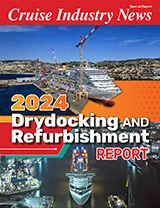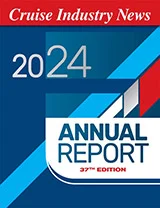In order to speed up prototyping, so-called Development Acceleration Centers (DACs) have been set up by Wartsila, which said it is also using the concept with Royal Caribbean to develop aspects of intelligent vessels further.
The first DAC opened in Helsinki in October, a second is due to open in Singapore, with more in the planning stages. In addition, pop-up DACs can be set up on customers’ sites.
“With the DACs we are focused on working with a customer on a particular idea or project, using a start-up culture and mind set,” explained Marco Ryan, chief digital officer and executive vice president at Wartsila. “We are working to reach outcomes quickly, what we call a minimal viable product (MVP); we are talking days or weeks, not months or years in the traditional R&D fashion.
“As soon as we decide if a product is viable, we move it to the next stage, accelerating its development. If it does not work, we stop it right away.”
In the marine industry, one of the objectives is to create so-called intelligent ships. Explained Riku-Pekka Hagg, vice president of ship design: “It starts with operations that can be automated, creating intelligence within the ship, eventually creating more reliability and safety.”
Ryan described the intelligence as being on three different levels. First, using technology and data onboard to optimize operations. Secondly, optimize operations of a fleet of ships by sharing information and thus driving safety, environmental impact and efficiencies. And thirdly, integrating the ship or fleet in an eco-system where a ship could even operate autonomously and unmanned.
For cruise ships, practical intelligence applications could be applied in the navigation system, providing navigation and docking assistance, as well as for collision avoidance, according to Hagg.
“In the big picture, we look at the integration of the mechanical side, which is very much about hardware, and the automation, providing decision support and enabling smart decisions on the bridge and in the engine room,” Ryan added.
Using computer algorithms machines can learn and make decisions, or provide recommendations for humans to make decisions, based on data.
“If you were to load information for a specific route from 1,000 ships, then filter that by weather conditions, time of year, and type of vessel, that would lead to a better data-driven decision,” Ryan said.
Other topics for the DACs include hybrid power solutions including fuel cells, which in turn will open up new ways for optimization inside a vessel.
“When cruise lines introduce new generations of vessels they always represent technology leaps,” Hagg said. Looking forward, he said that cruise ships of 2030 or 2040 could be hybrids, but not necessarily with combustion engines, instead combining other solutions such as solar and wind power, for instance.
“Some of these technologies require more maturity before they can be put on vessels, but typically when you see the cruise industry becoming curious about something, you see the leapfrogging starting to happen. Technology development is not linear but exponential.”
At the moment, the focus is on fuel and powerplants, because of the cost of fuel and emissions regulations, but in the future the focus may shift to other areas, developing technologies for the rest of the ship as well, Ryan added.



